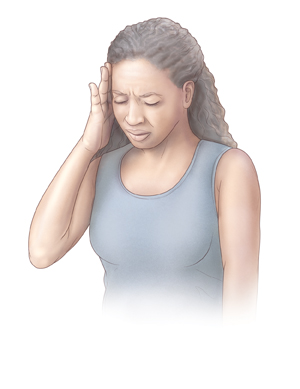Rebound Headache
 |
| Overuse of pain medications can lead to rebound headaches. |
You use pain medicines called analgesics to treat your headaches. You are now having more frequent or more intense headaches (rebound headaches) than you had before. This is your body’s response to too much pain medicine. Overuse of prescription pain medicines can cause these headaches. But so can over-the-counter medicines like acetaminophen or ibuprofen. Products or medicines that contain caffeine may help treat headaches, but taking them in large amounts and then suddenly stopping them may trigger withdrawal headaches.
Symptoms of rebound headache include having:
-
A mild to moderate headache for 15 or more days each month in a person with pre-existing headache disorder.
-
A headache when you wake up that continues most of the day.
-
Headaches that get worse over time.
-
A need for more and more medicine to treat headaches.
-
Nausea, vomiting, and diarrhea.
-
Neck pain.
-
Poor sleep.
-
Underlying anxiety and depression.
There are no specific tests to diagnose this condition. Your health care provider can often diagnose rebound headaches by your symptoms and medicine history. It's very important to tell the healthcare team about all of the medicines you take. This includes vitamins, herbal supplements, and any other treatments you use to stay healthy. You may need certain tests to rule out other causes of your headaches. In the emergency room, you may be given a non-analgesic pain medicine to treat the pain or stop future headaches.
Home care
Treatment involves stopping the use of your pain medicines. Your health care provider can tell you how to safely do this. You may be able to stop right away. Or you may need to take less and less over time (taper off). This will depend on the medicines you have been taking. To do this, follow the schedule that your provider gives you. If you are taking pain medicines for other types of pain at the same time, your healthcare provider may need other specialists to participate in your care. You may be given other medicines to make it easier to stop the ones causing the rebound headache.
-
For the first week or so after stopping, the headaches will likely get worse. You may also have withdrawal symptoms. These often include nausea, vomiting, and trouble sleeping. These symptoms can last up to 10 days. You may be given a preventive medicine to help relieve pain and withdrawal symptoms. Take this exactly as you have been told. It's vital to not take daily pain medicine. If you do so, rebound headaches will continue.
-
Caffeine can make rebound headaches worse. If you have caffeinated drinks every day, slowly cut your intake.
-
Keep a written log of your headaches. This can help you and your provider track your progress. Bring the headache journal to your appointments.
-
Be patient. It can take about 2 to 6 months to stop having rebound headaches.
-
Once you have broken the headache cycle, be careful not to start it again. You will almost always need to restrict your medicine use. Work with your provider to make a treatment plan for headache pain that has a low risk of causing rebound headaches.
-
If you were given a preventive medicine, tapering off that medicine may be done once the rebound headaches have stopped.
-
Relaxation can help lower tension and relieve pain. Try a massage, meditation, yoga, or other relaxation techniques. Or make time for a relaxing hobby that you enjoy.
Follow-up care
Follow up with your health care provider as advised. It is important to treat any underlying mental health condition. Your provider may refer you to a mental health professional.
When to get medical advice
Contact your health care provider or seek medical care right away if any of these occur:
-
Fever of 100.4°F (38°C) or higher, or as directed by your provider
-
Headaches that wake you from sleep
-
A type of headache you've never had before
-
Headache that gets worse despite rest and medicine
Call 911
Call 911 right away if you have:
-
A headache that starts very suddenly or is the "worst headache of your life."
-
A headache with a stiff neck, rash, confusion, weakness, numbness, seizure (convulsion), or trouble talking.
-
Repeated vomiting or vision problems that don't go away.
-
A headache that starts after a head injury or fall.
Online Medical Reviewer:
Marianne Fraser MSN RN
Online Medical Reviewer:
Rita Sather RN
Online Medical Reviewer:
Vinita Wadhawan Researcher
Date Last Reviewed:
1/1/2025
© 2000-2025 The StayWell Company, LLC. All rights reserved. This information is not intended as a substitute for professional medical care. Always follow your healthcare professional's instructions.